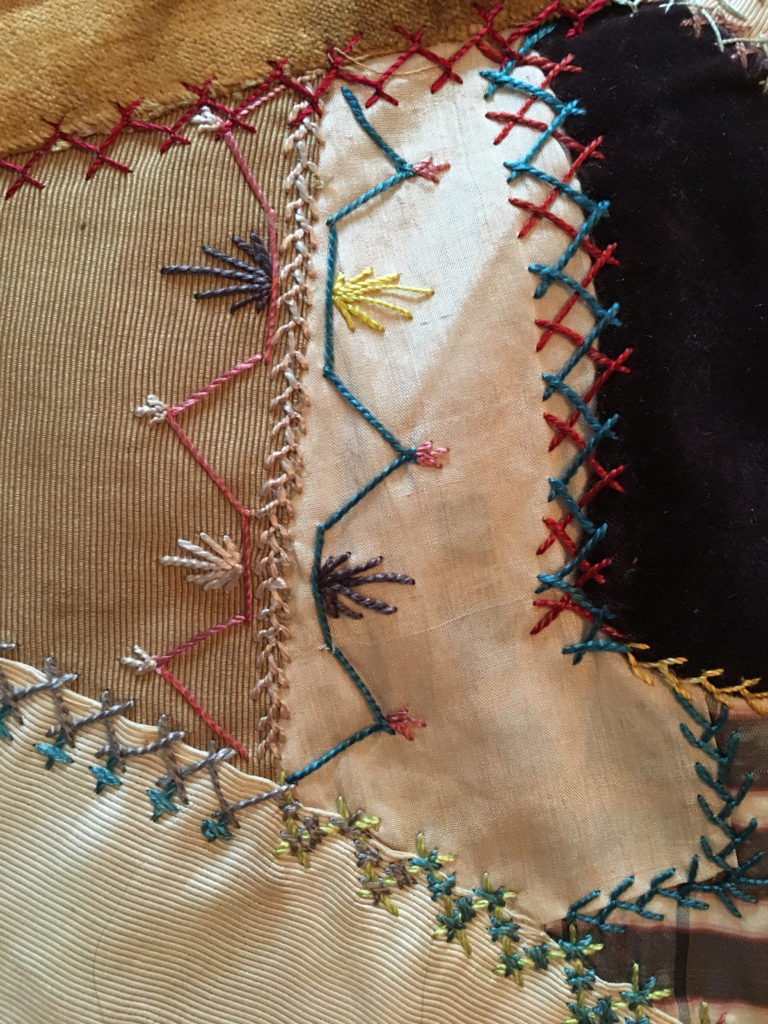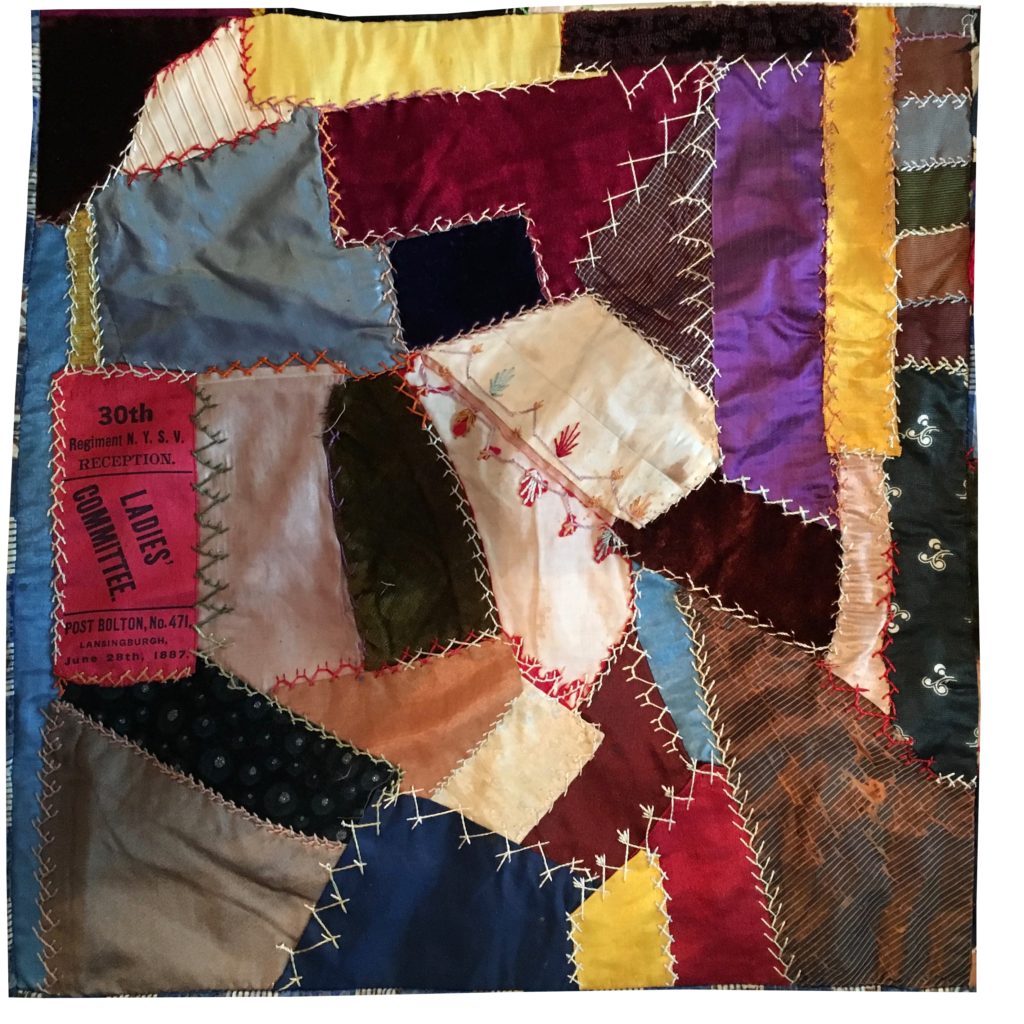The crazy quilt mania is devastating the Northern cities. The young ladies ask for hat linings, scarfs and even the linings of spike coats. If high-buttoned vests should go out of style the men would have to buy new scarfs. Many of them have now no silk in their hats. The scraps thus gathered are thrown in an alleged careless way into a quilt that becomes, after it is embroidered, a sofa cover. The mania is very prevalent and absorbing. It absorbs the best goods of the young men.—Atlanta Constitution.
Lansingburgh Courier. December 22, 1883: 1 col 7.

A “crazy” variety of silks and stiches. Detail from one square of a crazy quilt apparently made in Lansingburgh between 1887 and 1889.
—
The Form of Fancy Work Which Occupies Many Young Minds and Hands.
—
The particular species of fancy work which has lately possessed the minds and fingers of young women is that of “crazy quilts.” Somebody has decreed that silk quilts must be made of odd pieces, not cut in regular blocks as our grandmothers made patchwork, but basted on a cambric lining, helter-skelter, the edges turned in and worked over in brief-stitch or cut-stitch in floss. The colors of the patches and sewing silk are chosen hap-hazard; the “crazier” the effect of the work the better. Somebody made this decree, but the women went even further in carrying it out. Not content with crazily stitching the odd pieces of silk together, they now embroider every separate patch in floss, or they decorate it with painting, or they attach to it a flower cut from brocade, like an applique figure, and instead of using only brief-stitch and cut-stitch for the joining, they employ every variety of fancy stitch, including all the conceits known as South Kensington and Point Russe. And these same ladies defend their practice by saying that crazy work affords ample room for economy, as it enables one to use every scrap of silk or velvet, however small, and it exercises the taste and ingenuity, as it gives the widest field for the display of originality. So they have all taken the craze over crazy work. When they do not make quilts of it they make tidies, lambrequins, table-covers and borders for their other quilts.
But, sooner or later, this fashion must die out. The test of beauty is often utility, and any expert needlewomen must know that the floss raised above the surface of the quilt must wear out before the silk patches will. [This does not seem to have been true.] What then will become of the quilt once the stitches have given way? Then the old-time patterns, already become fashionable again, will take on a new lease of favor. These were made by carefully cutting out the silk, basting them over pieces of stiff paper and overseaming them finely on the wrong side. Among the old patterns those now growing in popularity are the tea-box, consisting of three diamonds, forming a cube in perspective; the log cabin, or State House steps, displaying graduated strips surrounding a central square, so as to form, as it were, piles of logs or flights of steps, and the patty-pan, or group of seven hexagons, the whole effect of a quilt so made being that of a pavement of hexagonal tiles.
Lansingburgh Courier. May 31, 1884: 4 col 1.
—
Rain Delaying Preparations for County Exhibitions—Exhibitors at the Rensselaer County Fair—In Washington County.
The disagreeable weather has had considerable effects upon the preparations for the successful opening of the Rensselaer county fair at Rensselaer park. Exhibitors have been greatly delayed, and the work of arranging the displays will not be completed before to-night. There are still a number of places in the various buildings set apart to exhibitors which have not been filled, owing to the detention of the goods by the rain. Many exhibits were being brought in this morning, and, by to-morrow, if there be pleasant weather, the fair grounds will look like a great bazaar.
In the art department there is a very handsome display. Miss Lempe of Lansingburgh and her pupils have a large number of oil paintings, representing various scenes. Mr. Flinton of Troy has several crayon sketches, and Miss Augusta Draper, also of this city, has a fine collection of paintings; J. R. Allis of Lansingburgh has a photographic display, in which the pictures of the members of the fire department of Lansingburgh are quite prominent. H. J. Mason and Lewis W. Raymond have each an exhibit of furniture. Ward H. Wilkinson, has a lot of parrots, paroquets and canaries, which make the air resonant with their cries. next to him H. C. Hearman, an amateur taxidermist, has an exhibit of stuffed birds, mostly of domestic kinds, which proves a great attraction. H. E. Foxall of this city shows fancy horseshoes, the ornamental part of which consists of a design showing a monogram of the various secret societies and orders in the United States. The east side of this building is devoted principally to the exhibits of fancy work. There are laces, embroideries, crazy quilts and handsome chair cushions, which show hours of skillful work with the needle. […]
Troy Daily Times. September 14, 1887: 3 col 2.

A square (one of twelve) from a crazy quilt apparently created in Lansingburgh; the red silk ribbon reads:
30th
Regiment N. Y. S. V.
RECEPTION.
LADIES’
COMMITTEE.
POST BOLTON, No. 471,
LANSINGBURGH,
June 28th, 1887.
(Post Bolton was the local Grand Army of the Republic organization.)